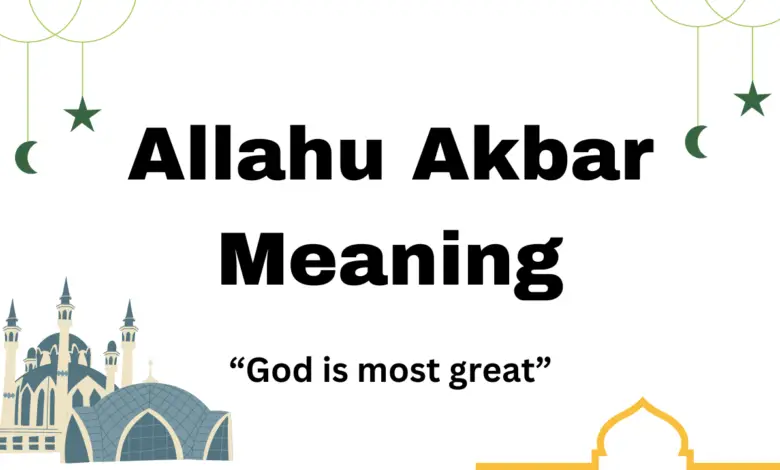Allahu Akbar Meaning | Islamic Phrase | Profound Meaning | 2023
Understanding the Powerful Islamic Phrase

Allahu Akbar Meaning
“Allahu Akbar” translates to “Allah is the Greatest” or “God is Great” in English. It is an Arabic phrase commonly used by Muslims to express the greatness and oneness of God.

- Mashallah Meaning | Profound Expression | Significance | 2023
- Muhammad Meaning | Islamic Name | The Messenger of Islam | 2023
- What is the Pookie Meaning in Islam | Spiritual Significance of “Pookie” in Islam | 2023
- 444 Tattoo Meaning in Islam : Mystery Revealed
- Shahada Meaning | Powerful Beacon | 2023
Introduction of Allahu Akbar Meaning
“Allahu Akbar” is a phrase known to people around the world, yet its true meaning often remains shrouded in mystery and misconceptions. Often associated with Islam, this powerful phrase holds a deep and multifaceted significance that extends beyond religious contexts. In this article, we will explore the meaning of “Allahu Akbar” and its various dimensions, shedding light on its spiritual, cultural, and historical significance.
The Literal Translation of Allahu Akbar Meaning
“Allahu Akbar” is an Arabic phrase that can be translated as “Allah is the Greatest” or “God is Great.” It is a fundamental declaration of faith in Islam and is used in various religious contexts, such as daily prayers, during moments of gratitude, and in times of distress. However, its importance goes beyond religious rituals.
Theological Significance
At its core, “Allahu Akbar” underscores the central tenet of Islamic monotheism, which is the belief in the absolute and unparalleled greatness of Allah (God). Muslims believe in the oneness of God, and this phrase serves as a constant reminder of God’s omnipotence, omnipresence, and omniscience. It reinforces the idea that nothing and no one can compare to or compete with the greatness of God.
Spiritual Connection
Muslims often use “Allahu Akbar” to deepen their spiritual connection with Allah. It is recited during prayers and supplications, acting as a way to center oneself and focus on the divine. In moments of meditation and reflection, the phrase serves as a reminder of God’s greatness, fostering a sense of humility, awe, and reverence.
What is Allahu Akbar Meaning?
Allahu Akbar Meaning is “Allah is the Greatest” or “God is Great” in English. It is an Arabic phrase commonly used by Muslims to express the greatness and oneness of God.
Is “Allahu Akbar” exclusive to Islam?
While “Allahu Akbar” is strongly associated with Islam, the concept of recognizing the greatness of a higher power is universal and can be found in various religious and spiritual traditions.
When is “Allahu Akbar” typically used in Islamic practices?
“Allahu Akbar” is used in various Islamic practices, including daily prayers, during the call to prayer (Adhan), when Muslims perform rituals like the Takbir, and in moments of gratitude and supplication.
What is the significance of “Allahu Akbar” in Islamic theology?
“Allahu Akbar” emphasizes the central belief in Islamic monotheism, asserting that there is no deity but Allah, and that Allah is incomparably great, powerful, and all-knowing. It underscores the oneness and supremacy of God in Islam.
How does “Allahu Akbar” relate to spirituality in Islam?
“Allahu Akbar” is a powerful spiritual tool in Islam. Muslims use it during prayer to center themselves and establish a deep connection with Allah. It serves as a reminder of God’s greatness and fosters a sense of awe and reverence.
Historical Significance
The phrase “Allahu Akbar” has a rich historical context. It has been used for centuries in Islamic civilizations to rally troops in times of war, inspire courage, and unite people under a common cause. Throughout history, Muslim leaders and communities have invoked this phrase to express their faith and resilience, even in the face of adversity.
Cultural Significance
Beyond its religious significance, “Allahu Akbar” has permeated various aspects of Islamic culture. It can be heard in traditional music, poetry, and art. It is often inscribed on calligraphy, architectural designs, and even flags. This cultural incorporation of the phrase reflects its enduring importance in the lives of Muslims and their societies.
Misconceptions and Misuse
Unfortunately, “Allahu Akbar” has sometimes been misused and misconstrued, particularly in the media. It has, at times, been associated with acts of violence and terrorism, perpetuating a skewed perception of its meaning. It is essential to understand that the phrase itself does not promote violence. Its misuse by individuals with extremist ideologies does not represent the beliefs of the majority of Muslims, who use it as a source of spiritual inspiration and devotion.
Universal Message
While “Allahu Akbar” is deeply rooted in Islamic tradition, its message transcends religious boundaries. The idea of recognizing the greatness of a higher power is a concept shared by many faiths and belief systems. In a world of diverse cultures and religions, this phrase reminds us of our shared humanity and the common thread of spiritual seeking that unites us.
Conclusion
“Allahu Akbar” is a phrase that carries profound theological, spiritual, historical, and cultural significance. Its meaning extends far beyond a simple translation, as it encapsulates the core beliefs of Islam and serves as a constant reminder of God’s greatness. It has a rich history and cultural resonance within the Muslim world and, at the same time, offers a universal message that transcends religious boundaries. Understanding the depth and significance of “Allahu Akbar” can lead to greater appreciation for the diversity of beliefs and cultures in our world. It is a phrase that encourages humility, reverence, and the recognition of something greater than ourselves, no matter our faith or background.
Is “Allahu Akbar” only used in religious contexts?
No, “Allahu Akbar” extends beyond religious contexts. It has cultural and historical significance and is often incorporated into various aspects of Islamic culture, including music, calligraphy, and art.
Has “Allahu Akbar” been misused or misunderstood?
Yes, “Allahu Akbar” has sometimes been misused and associated with acts of violence in the media. It’s important to recognize that its misuse by extremists does not represent the beliefs of the majority of Muslims, who use it as a spiritual affirmation.
Can people of other faiths or beliefs use “Allahu Akbar”?
While “Allahu Akbar” is rooted in Islam, its message of recognizing the greatness of a higher power can resonate with people of diverse faiths and beliefs. It promotes a sense of humility and shared spirituality.
Are there variations of the phrase “Allahu Akbar” in different languages?
Yes, variations of the phrase exist in different languages with Muslim populations. For example, in Turkish, it is “Allahu Ekber,” and in Urdu, it is “Allah-o-Akbar.”
How can one show respect when hearing “Allahu Akbar” being used by someone of the Islamic faith?
Showing respect is as simple as acknowledging the significance of the phrase for the person using it. You can listen attentively, refrain from interrupting, and, if appropriate, offer a kind and understanding response.





